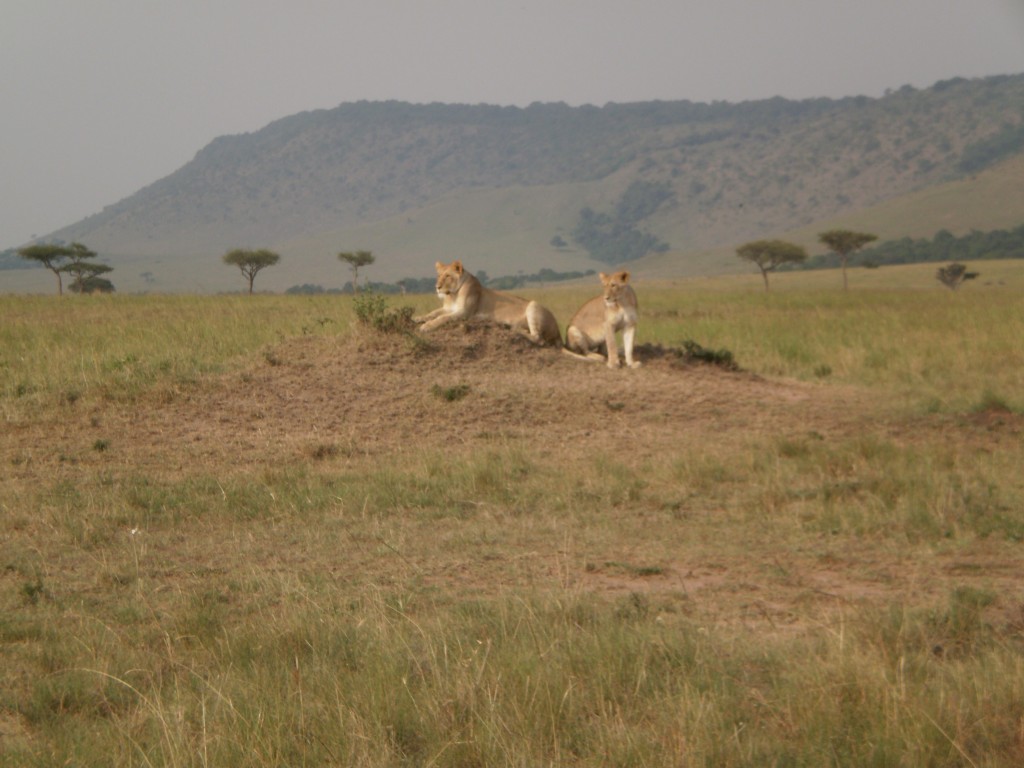These lions picked this spot to hunt. It is a little higher than the surrounding ground and gives them good sightline to game. They are in a good ambush point for animals that went up into the hills behind them last night and will be coming down to the plain this morning. The ant hill they are sitting on may have been the den of a warthog and they had a good meal there at one time and are hoping for another. Any of these reasons may be the reason that they are there but one thing is sure – they picked this spot. Life is too difficult in the wild to waste energy just wandering off to sit on an ant hill somewhere.
I was thinking about all of this as I watched this pair. If they made a kill from this vantage point in the past maybe they are like humans that go back again and again to the place of some kind of success. The problem with that is that all the elements of that initial success may be there but one and it won’t happen again. A small puff of wind from the wrong direction; a noisy bird off in the distance that wasn’t there before; a shadow cast by a vulture at just the right spot; and those initial conditions can never happen again. Even if all of the initial conditions do happen at the same time perfectly, a small event in the midst of them can change it all. The rumble of a hungry belly at just the right moment and the whole seemingly perfect ambush, just like it happened before is over.
It is called ‘chaos theory’. You probably heard the popularized version in the movie “Jurassic Park”. The popular quote is that a butterfly moving it’s wings in China may cause a hurricane in the Caribbean. The more complex concept says that a system should be predictable and determined. So if I can understand conditions in a system 3 hours ago I can tell you what the system will be like an hour from now. This ability is called determinism and it holds true for all dynamic systems. However, the initial conditions of many complex systems cannot be accurately determined. When systems exhibit sensitive dependence on initial conditions, they are no longer predictable, and determinism no longer holds. One complex system that is often used as a typical example, is the weather.
We have theological discussions about this quit a bit. Suffice it to say the parodox for us is that God controls everything and we have no ‘free will’ and yet God asks the ‘new person in Christ’ to do stuff like care for the neighbor, body and soul.This is a part of a nice sermon given by Albert Collver the director of Church relations for the LCMS.
As Luther said, a “Christian lives not in himself, but in Christ and in his neighbor. … He lives in Christ through faith, in his neighbor through love” (AE 31:371). And you do love! – not by your own efforts or striving, for then, indeed, it would be impossible – the love would not be pure enough, or frequent enough. But with God all things are possible, and so with his divine love, his superabundant love poured out onto you in Baptism and into you in the Lord’s Supper, his love overflowing through you and thus onto others – with this love, you see; with THIS love you love and you serve your neighbors.
Think of the ‘chaos’ we could unleash in this world if we would do that. The seemingly predetermined poverty that we see around us may be changed and sanctified. The words of Jesus, “the poor you will always have with you” would be, as someone famously said, “descriptive, not prescriptive”.



Wow, Thanks Bernie– As a electrical engineer working with control systems, I wonder a lot how I could put my training in control systems to good use for the Lord. You’ve provided a neat example!